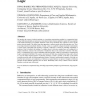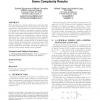233 search results - page 24 / 47 » Logic, Knowledge Representation, and Bayesian Decision Theor... |
LOGCOM
2000
13 years 7 months ago
2000
We introduce the concept of reflection principle as a knowledge representation paradigm in a computational logic setting. Reflection principles are expressed as certain kinds of l...
ATAL
2005
Springer
14 years 1 months ago
2005
Springer
Many industrial or research activities are so expensive that it is often benefitable for the involved agents to cofund the construction or the purchase of a common required resou...
ATAL
2008
Springer
13 years 9 months ago
2008
Springer
Although normative systems, or social laws, have proved to be a highly influential approach to coordination in multi-agent systems, the issue of compliance to such normative syste...
ICPW
2007
13 years 9 months ago
2007
The Rule Responder project (responder.ruleml.org) extends the Semantic Web towards a Pragmatic Web infrastructure for collaborative human-computer networks. These allow semi-autom...
IJCAI
2007
13 years 9 months ago
2007
A formula in first-order logic can be viewed as a tree, with a logical connective at each node, and a knowledge base can be viewed as a tree whose root is a conjunction. Markov l...


